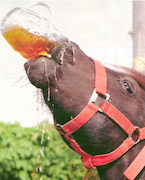|
Same temps as ale yeasts typically. There are many strains and they do have different flavor profiles and uses. All Brett beers can work, but itís very much not a homogeneous microbe. Regardless of when you add the Brett, make sure itís as close to terminal as possible. Adding it to a finished beer at bottling is possible if you use a yeast that leaves it sufficiently fermented to start. If you add it after primary, Iíd move it to something else as itíll take 3-6 months easily before being at terminal gravity. Itís not like ale yeasts where a stable reading a couple days apart is good to bottle, but more weeks apart. If you do transfer, try to keep down O2, and leave as little headspace as possible. And go read the milk the funk wiki again a few times because it answers questions better than I probably can.
|
|
|
|

|
| # ? May 19, 2024 15:19 |
|
Eeyo posted:I've been wondering a bit about the mixed ferm stuff. I do want to eventually get into doing beers with some brett (Brettanomyces spp.), I like the ones I've tried that I get at a liquor store and I think it could be fun to try some of the funkier styles. In my experience the difference in copitching sacch and your brett/bugs versus doing a staggered pitch is not all that significant. You can easily find people with strong opinions to the contrary, but both approaches are well represented among the top breweries doing this style, so I would just do what you find to be most convenient. Carbonation is not a huge issue unless you're adding brett at bottling time, and although I'm sure with experience even that approach could be done pretty safely, I don't think there is much to be gained by doing so. In any case, it all boils down to knowing how far your culture(s) will attenuate. A lot of people doing mixed ferm beers will use saison strains for primary that work fast and rarely finish above one, or even half a degree plato. At that point there's not much further brett is going to take you, so If you're bottling in champagne bottles you have plenty of leeway. Oxygen exposure is as much of a worry with mixed-ferm beer (if not more so) as with regular beers, but if you're looking to condition your beer in fermenters for a long time (perhaps using oak) I guess it could be worth getting it off the yeast, although I've let them sit on yeast for six months with no ill effects. These days, I prefer to get mixed-ferm beers into bottles as soon as they reach terminal gravity, and condition them in their bottles. For me, that means I'll have the beer in a fermenter for about three weeks and up to two months if using fruit. With that time-frame I see transfers as being more trouble than they are worth. Temps also vary quite a bit among the breweries I have looked into, with some preferring to stay at the low end of the recommended temps for their yeasts, like you would with most other ales, while others aim for the top end of that range. My impression is that very warm fermentations are going out of style for anything but kveik-based beers. I like to stay in the mid 70's, 80f at the very most. thotsky fucked around with this message at 22:36 on Jan 25, 2021 |
|
|
|
Started a batch of apfelwein on Saturday, added 8 pounds blackberry puree, the puree had a brownish color to it but it didn't smell or taste off. Relax? Dump it?
|
|
|
|
Probably fine, almost every fruit I've used in beer looks like that after a couple of days.
|
|
|
|
I'm starting to think I should stop pasteurizing the honey I use in meads and just make sure to sterilize the water and mixing vessel used. Unpasteurized honey should contain some wild yeast strains buuuuut, not a lot of folks do the pasteurization thing. Those CS mead folks don't. I dunno.
|
|
|
|
just chiming in to say I'm super excited for my next planned beer, I'm able to use malt that's grown and malted locally. They also have hops but generally only sell to breweries, have a friend who pretty much knows everyone in my area, including a few of the breweries that use their hops, hoping they pull through for a 100% locally sourced organic farm to table beer. Oh god I feel dirty saying those words together.
|
|
|
|
That is really freakin cool though.
|
|
|
|
tater_salad posted:just chiming in to say I'm super excited for my next planned beer, I'm able to use malt that's grown and malted locally. They also have hops but generally only sell to breweries, have a friend who pretty much knows everyone in my area, including a few of the breweries that use their hops, hoping they pull through for a 100% locally sourced organic farm to table beer. Oh god I feel dirty saying those words together. Sometimes you can email the hop farm and theyíll sell smaller bags directly in person. I did that with Crosby Hop Farms in Oregon. They donít advertise it on their website but I figured asking couldnít hurt. The guy even gave me a tour of the whole facility.
|
|
|
|
rockcity posted:Sometimes you can email the hop farm and theyíll sell smaller bags directly in person. I did that with Crosby Hop Farms in Oregon. They donít advertise it on their website but I figured asking couldnít hurt. The guy even gave me a tour of the whole facility. yeah we will see what my friend with connections can scrounge up ( he gets a portion of all my beer brewed). I dunno if they really even have anything left being that it's winter.
|
|
|
|
tater_salad posted:yeah we will see what my friend with connections can scrounge up ( he gets a portion of all my beer brewed). I dunno if they really even have anything left being that it's winter. They won't have fresh hops, but if they process the hops themselves they'll likely have dried cones/pellets. If they send them for processing then they may or may not keep them in cold storage themselves. Unless it's a really small farm they shouldn't be running out in their storage until July. Most breweries aren't going to have the money or space to install cold storage to store hops for a whole year. That said, they may have already sold everything and not have anything for spot purchases, or even do less than 11# at a time. If you're in the PNW you will have no issues. If you're anywhere else except maybe Michigan this is a task that takes more legwork. Hop farm and production center tours during harvest can be a great experience and smells like heaven. E: In August/Sept you can also check local groups to see who's giving away hops from growing their own too. A lot of people just don't want to deal with all of it every year, or they just have too much.
|
|
|
|
Jhet posted:They won't have fresh hops, but if they process the hops themselves they'll likely have dried cones/pellets. If they send them for processing then they may or may not keep them in cold storage themselves. Unless it's a really small farm they shouldn't be running out in their storage until July. Most breweries aren't going to have the money or space to install cold storage to store hops for a whole year. That said, they may have already sold everything and not have anything for spot purchases, or even do less than 11# at a time. If you're in the PNW you will have no issues. If you're anywhere else except maybe Michigan this is a task that takes more legwork. I'm not sure if they process or just have whole, afaik they only sell hops in bulk to breweries which may be long gone due to being in the northeast. My LHBS carries their malt but their hops is only a passing mention on their site. I know that they grow hops becuase I've driven by.
|
|
|
|
Nice piece of fish posted:I'm starting to think I should stop pasteurizing the honey I use in meads and just make sure to sterilize the water and mixing vessel used. Unpasteurized honey should contain some wild yeast strains buuuuut, not a lot of folks do the pasteurization thing. Those CS mead folks don't. I dunno. I sanitize the carboy when I make mead, but I just use straight up municipal supply water. I add a crushed Campden tab to remove chlorine/chloramine, but that's it for water sanitation. I guess you could boil and cool the water, but I have not bothered. piss boner posted:Started a batch of apfelwein on Saturday, added 8 pounds blackberry puree, the puree had a brownish color to it but it didn't smell or taste off. Relax? Dump it? Way too early to dump it. The ingredients are already committed; you won't gain anything by dumping it, and you won't lose anything by keeping it. Wait until you can taste it to decide to keep or dump. Jo3sh fucked around with this message at 02:29 on Jan 27, 2021 |
|
|
|
How long will yeast stay good for if refrigerated? I bought a kit like back in the late summer/early fall that I've never gotten around to brewing. The package the yeast came in said to refrigerate ASAP, which I did, but it's been sitting there for months now because life has gotten in the way.
|
|
|
|
If youíre worried you can make a starter. Some of the cells will have died, so it will work, but not quite as fast possibly. Depends on the strain as to how fast, but you can still save it.
|
|
|
|
For a liquid yeast pack that old you can definitely make a starter 2 days before you brew and see if it does anything. If nothing happens, you can always grab a pack from the local homebrew store the day after you brew and pitch it late, assuming it's not anything too crazy high gravity. What yeast is it?
|
|
|
|
BAE OF PIGS posted:How long will yeast stay good for if refrigerated? I bought a kit like back in the late summer/early fall that I've never gotten around to brewing. The package the yeast came in said to refrigerate ASAP, which I did, but it's been sitting there for months now because life has gotten in the way. I used one last month that was like 9 months old. Worked... slow. Might be a bit risky, depending on what you're making. I suggest making a starter of it first, that should definitely be possible.
|
|
|
|
BAE OF PIGS posted:How long will yeast stay good for if refrigerated? I bought a kit like back in the late summer/early fall that I've never gotten around to brewing. The package the yeast came in said to refrigerate ASAP, which I did, but it's been sitting there for months now because life has gotten in the way. If it's dry yeast, don't worry about it.
|
|
|
|
I'm thinking about getting back into the brewing game; I had around ~50 all grain batches under my belt but haven't done anything in 5-6 years (moved into a place that wasn't great for it, just moved again). I think my best best is 2.5 gal all-grain batches, given space, and I am going to focus on English styles, since I love them and they're so hard to find in the US. Couple questions: 1. My old LHBS doesn't exist anymore, as far as I can tell. Another one seems to have decent ingredients but not a lot in the way of equipment. Where's best to order a kettle/buckets/tubing/etc from these days? 2. I had switched to BIAB by the end of my previous brewing stint, after having previously done no-sparge in a little (probably 4-5 gal) cooler with a stainless steel braid (hooked up to a siphon, since there was no spigot on the cooler). I'm a little worried about BIAB because of height clearance above my stove's burner, is the small-cooler solution probably still the best thing, or am I missing out on other options? (I assume the current guidance is still that single-step infusion mashes are OK for English styles; I did mess around with multi-step infusions and even decoctions [for German styles obviously] in the past, but didn't see the returns on that extra effort.) 3. I won't have temp control, though I will have some cool-ish closets. What English ale yeasts are most heat tolerant, if things get up into the mid 70s? Kveik wasn't a thing when I was brewing before, so I have no experience with it, but I assume I should avoid kveik yeasts if I'm looking for English ale character--let me know if there's something I'm missing, though! 4. I'll probably bottle in bombers, mostly (and might even bottle-condition in growlers, even though that's "not recommended", since I'll be aiming for low carbonation at like 1 vol), but... is there any reasonable way I could serve on cask? edit: Comedy option, do 5 gal batches on my balcony with a propane burner (though I'd have to hook a garden hose to my kitchen sink and run it through the balcony door while brewing), and convert a keezer to cellar temps for fermentation, installing a beer engine to serve from corny "casks" directly from the fermentation chamber... this is probably too much, though. Scythe fucked around with this message at 20:54 on Feb 1, 2021 |
|
|
|
Scythe posted:is there any reasonable way I could serve on cask? Beer engines are not completely impossible to find, as you could easily draw from a Corny just by opening the relief valve. That would let air in, of course. There must be a way to do low-pressure CO2 put a gas blanket in the headspace without providing serving pressure. I even faked up a beer pump from a potable water hand pump one time. I used one of these and replaced the spout with a capped copper tube with some tiny holes drilled in the end to act as a "sparkler."
|
|
|
|
Jo3sh posted:Beer engines are not completely impossible to find, as you could easily draw from a Corny just by opening the relief valve. That would let air in, of course. There must be a way to do low-pressure CO2 put a gas blanket in the headspace without providing serving pressure. There are such things as "cask breathers" which are basically CO2 regulators set to atmospheric pressure, if I understand correctly. I've also heard of people using propane regulators hooked up to CO2 for the same thing, because propane is pretty low pressure.
|
|
|
|
I am curious about this. Atmospheric pressure varies within a couple psi depending on weather. Is setting a regulator to 1psi not sufficient, or is the wait to pour prohibitively long for a beer engine? I assume at warmer temperatures that the dissolved co2 would still be pretty low, but I've never used a beer engine so am interested to hear how it works.
|
|
|
|
more falafel please posted:I've also heard of people using propane regulators hooked up to CO2 for the same thing, because propane is pretty low pressure. Hm, I had not heard of that, but here's just such a regulator, sold for just that use: http://www.homebrewing.com/equipment/cask-co2-breather/ Says here it's set up for 11" water column, or about 0.4 PSI. I like that. Now if only I could find a beer engine at a price I could justify.
|
|
|
|
Jo3sh posted:Hm, I had not heard of that, but here's just such a regulator, sold for just that use: I found a beer engine on Craigslist, the guy had bought it from a bar that was shutting down. He said he had always wanted to get it working but hadn't ever spent the time. He wanted $50 for it, which I figured was good enough, and like 6 years later I might eventually find the time to get it working.
|
|
|
|
Sorry for the obvious question, still a relative newbie. Is grain brewing the next step up from extract? I started with a 1 gallon mr beer kit a few years ago and have now done maybe 10-15 different batches with a Northern Brewer 5 gallon kit. Gone from various sized buckets to a carboy now. Have had real good success with Norther Brewerís stuff and it looks like they have all grain kits available. All grain seems like such a big step up from extract especially when I only brew once every couple months. Anyone make the leap while still only brewing a handful of times a year?
|
|
|
|
gooby pls posted:Sorry for the obvious question, still a relative newbie. Is grain brewing the next step up from extract? I started with a 1 gallon mr beer kit a few years ago and have now done maybe 10-15 different batches with a Northern Brewer 5 gallon kit. Gone from various sized buckets to a carboy now. Have had real good success with Norther Brewerís stuff and it looks like they have all grain kits available. Do you already do steeped grains? It's basically like that, but with a bunch of base malt too. Lot more volume, but a lot more variables to do different things. You only get one rate of extraction with extract. So if you want to do a dry saison, you can't really with extract. If you want to play with your body and mouth feel, you can do a couple things, but you still can't do as much as you can with grain. It's not really the end of the world though, and if you like what you're brewing then keep brewing it. If messing with a bunch of extra variables doesn't sound like fun for you, then definitely stick with extract and just have fun doing what you're doing.
|
|
|
|
Doing all-grain isn't really any harder than extract, the main problem comes from the extra volume. Boiling 3 gallons means you need to get a pretty big pot, but it's not so big you'll have to go to a special store for it. Trying to get 5.5 gallons in the fermenter probably means aiming for 6 gallons post-boil, which probably means 7 or 7.5 gallons per-boil, which means 8 gallons is pretty much the bare minimum, and that's a big pot. You might not be able to boil that on your kitchen stove, especially if it's electric, so now you're looking at an outdoor setup with a propane burner, etc. If you go the traditional fly sparge 3-vessel route, now you need two coolers (or two more pots) to hold your mash and your sparge water. Assuming you're using something like a 5 gallon pot now to do extract batches, I suggest you try smaller brew-in-a-bag (BIAB) batches with your current equipment. All you need is a bag, and you can get by with a paint strainer bag from Home Depot. That lets you try all-grain, learn all about mashing and whatnot, but if you don't like it, you're out under $10. If you do like it but want to do full size batches, you can either step up to full size BIAB, or do a batch sparge or fly sparge setup. Once you get over the hurdle, mashing really isn't hard or complicated.
|
|
|
|
Thanks for the insight all. Iíll probably stick with extract for a few more batches then maybe attempt a smaller biab. Didnít even know that was a thing, thanks! Have a chocolate milk stout from craft-a-brew conditioning in the bottles and next up will be NBís zombie dirt.
|
|
|
|
Thanks for all the thoughts about beer engines. Originally I was thinking it might be easier to literally use some kind of small wooden cask than it would be to rig up the whole corny + beer engine setup (with or without CO2)... but then I realized after I posted that I'd need temp control anyway. And, on review, cellar temps are cooler (52-56 F) than ale fermentation temps, so this is probably out: if I rearrange some furniture I could swing one keezer but not two, and it would seem dumb to temp control service but not fermentation. (That said, per internet searching, British homebrewers use things like these, which they call "polypins" over there, to do this. They collapse as they empty, so you don't need to refill with gas. Maybe someone with more space than me could use this idea!) Any thoughts on good internet vendors, advancements in small-cooler mash tun technology beyond the stainless braid, or particularly heat-tolerant British ale yeasts?
|
|
|
|
Kind of a dumb question, but is it ok to do sour beers in a SS fermenter? I was looking at yeast and I saw philly sour and thought it was interesting. I may save doing that for a little later so I can drink it when the weather's a bit warmer.
|
|
|
|
Eeyo posted:Kind of a dumb question, but is it ok to do sour beers in a SS fermenter? I was looking at yeast and I saw philly sour and thought it was interesting. I may save doing that for a little later so I can drink it when the weather's a bit warmer. Yup, stainless is non-reactive and easy to clean.
|
|
|
|
I've done several sours in by SS brewbuckets. As mentioned easy to clean and don't need to worry about cross-contamination if you use something like brett. Does anyone have a recommendation for a small bottle, ala 6 oz? We've been doing beer exchanges for our virtual homebrew club and when there are like 8 12 oz bottles it gets a bit rough there are the end.
|
|
|
|
|
Iíve only seen swing top clear bottles that small and I donít know if theyíre pressure rated or not. Also, Philly Sour is just a yeast. Itíll make your beer sour, but no reason to worry about it more than any other yeast you use.
|
|
|
|
Are plastic pails bad for brewing? When cleaning should I use the oversized pipecleaner brushes that came with the kit?
|
|
|
|
calandryll posted:Does anyone have a recommendation for a small bottle, ala 6 oz? Williams Brewing does sell a 7 ounce clear "nip" bottle: https://www.williamsbrewing.com/Home-Brewing-Equipment/Bottling-Canning/Bottles/7-oz-Clear-Beer-Bottles-Case-Of-24-Actual-Shipping-Item Apart from that, there are some mainstream commercial beers sold in nips. If you could find one with a pryoff lip, you could save those up. Jo3sh fucked around with this message at 22:34 on Feb 2, 2021 |
|
|
Jhet posted:Iíve only seen swing top clear bottles that small and I donít know if theyíre pressure rated or not. Yeah that's all the ones I've found in my searches. Was hoping someone knew of something that I may have missed.
|
|
|
|
|
Lots of mixers like ginger beer and tonic water are often sold in small bottles, not sure on the actual number of oz but it's definitely less than 12
|
|
|
|
gwrtheyrn posted:Lots of mixers like ginger beer and tonic water are often sold in small bottles, not sure on the actual number of oz but it's definitely less than 12 Those are twist offs and aren't super good for bottling, but should work in a growler sort of function. And they're normally clear glass. But they're also typically between 6-10oz. So maybe that could work, but it's still going to encourage skunky beer. Jhet fucked around with this message at 23:36 on Feb 2, 2021 |
|
|
|
Two months into fermenting a few gallons of Keep it Simple Stoner mead and my first taste of it made me fall in love. Interestingly enough I hate grapewine and beer.
|
|
|
|
I mean there's no real other use for 6 oz bottle other than filling it right before you go to some meet. Someone somewhere makes pretty small metal bottles that have wider mouths that you could use for the same purpose.
|
|
|
|

|
| # ? May 19, 2024 15:19 |
|
gwrtheyrn posted:I mean there's no real other use for 6 oz bottle other than filling it right before you go to some meet. Eh, I disagree, personally. Back in the day, I was looking for nip bottles to bottle a barleywine. That was before I was kegging.
|
|
|































